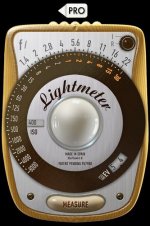BobBill
Established
What and Why? Just curious.
I have one on my I-phone (Pocket Light Meter) and seems easy to use and accurate. Free but floats dumb adverts atop. Always same as meter on my 4/3 digital machine (FWIW)
I have one on my I-phone (Pocket Light Meter) and seems easy to use and accurate. Free but floats dumb adverts atop. Always same as meter on my 4/3 digital machine (FWIW)



